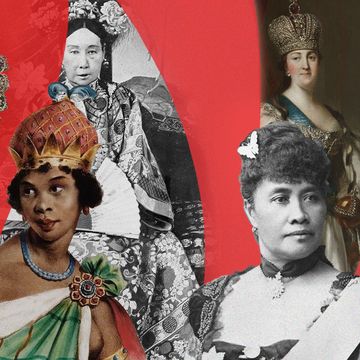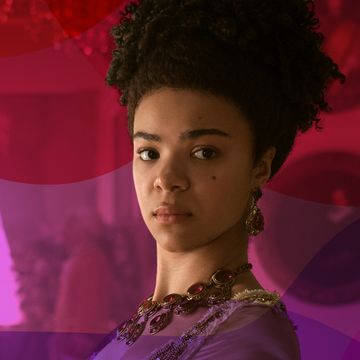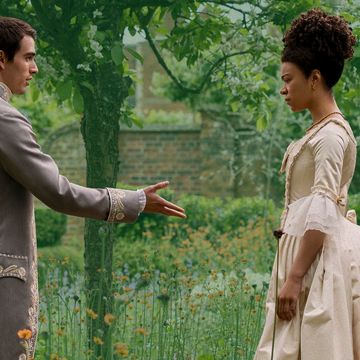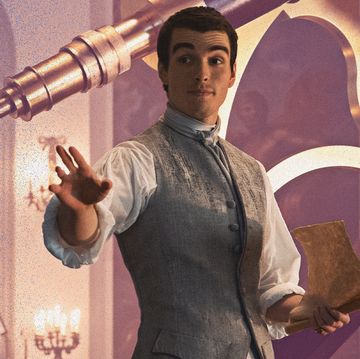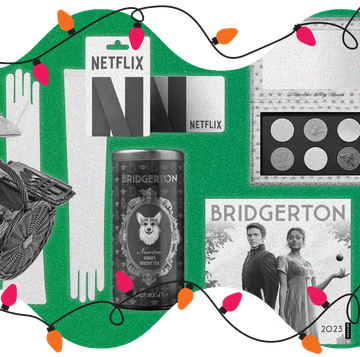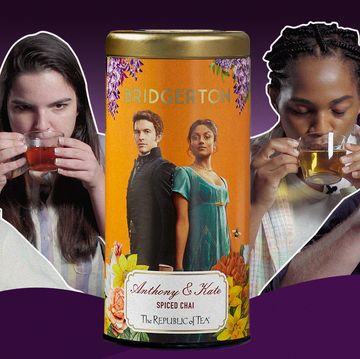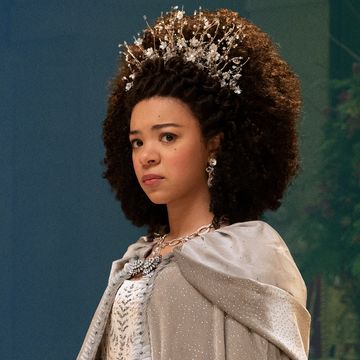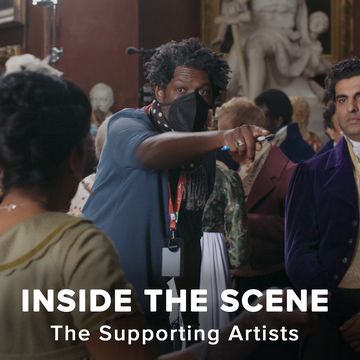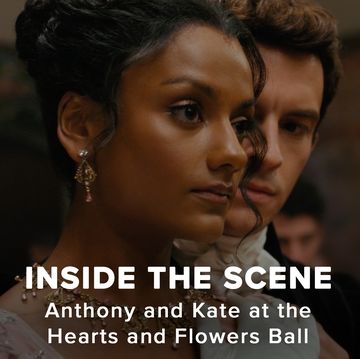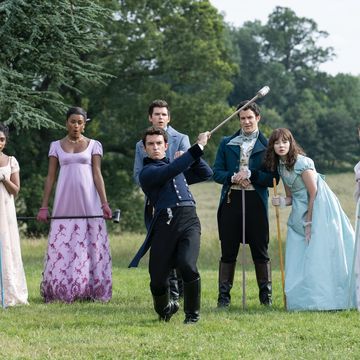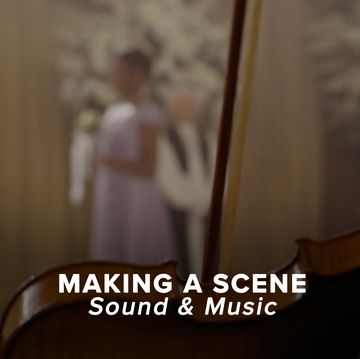By the opening scenes of episode three in Bridgerton, the chemistry between our two leads, Daphne Bridgerton and Simon Basset, has gone from simmering to a full-on boil, with the titillation of what’s to come of these two unwitting lovebirds in full swing. And let’s not forget that conversation in the middle of the promenade where Simon schools young Phoebe in the ways of, um, self-pleasure — is it hot in here or is it just us?
Bridgerton follows Daphne (Phoebe Dyvenor), the eldest daughter of the aristocratic Bridgerton family, as she debuts onto London’s high-stakes marriage market. In her search for a man whom she can both love and help carry on her family’s legacy, Simon, the mysterious Duke of Hastings who returns to London with much societal fanfare but swears he won’t marry, helps her in this effort through an elaborate ruse.
The rest of the first season of Bridgerton — Shondaland’s Regency-era drama now streaming on Netflix and based on the romance novels by Julia Quinn and helmed by Chris Van Dusen — unravels like so many great love stories: with torturous anguish and miscommunication, doubts and reconciliations, and an eventual melding of minds... and hearts. And Bridgerton stars Phoebe Dynevor and Regé-Jean Page seem to have reveled in their character arcs; their unreserved zeal is contagious when we talk to them about portraying people who get to experience such a grand love story.
“There’s this beautiful honesty at the heart of their relationship,” says Page, who crossed over from British to American TV as Chicken George in the 2016 History Channel remake of Roots and later co-starred in the Shondaland ABC series For the People. “[That honesty] is a hopeful thing to find in a love story, because essentially these two characters are the first people to call each other on their bulls—t. I think they meet someone who is significant enough to stand up to them and they enjoy that challenge.”
It’s true — neither Simon nor Daphne was going to get through their fauxmance unscathed, but it’s the journey we tune in for and the ups and downs that keep us hooked.
“Simon is the antithesis of everything Daphne values,” says Dynevor, who has been acting on British TV since she was 14 and made her U.S. debut with a recurring role in Darren Star’s Younger. “Simon rebels against that, which allows Daphne to completely be herself around him and drop her guard, which enables a connection that’s real.”
As for leading a series with a built-in audience of millions already, Dynevor feels a bit of added pressure. She’s been in similar positions before when she’s watched an adaption of a novel she’s loved and been disappointed by the outcome.
“You really want them to love the character that you’ve brought to life for them,” she says. “You hope that they love what you’ve done with their character, that you’ll be able to deliver.”
Hopefully, you’ve tucked in and are well on your way into the love story that carries Bridgerton, because there are some spoilers below as we chat with Dynevor and Page about the female gaze, the ups and downs (but mostly ups) of working so many hours with one person, and the secret to Daphne and Simon’s connection. The moral of the story? Find someone who dips you the way Simon dips Daphne. (Or the way he licks his spoon, for that matter…)
VALENTINA VALENTINI: I’m told that the first scene you shot was an intense love scene. And here I am, ironically, starting in the same spot for our interview — forgive me!
REGÉ-JEAN PAGE: I think it’s an appropriate place to start, actually. [That scene] is a big part of the show. It’s in the library, too, so it’s both literary and caring — everything you want from your love stories.
VV: Especially one based on a romance novel.
RJP: Exactly. I mean, Phoebe is literally on a pedestal at that point.
VV: Is it not intense or intimidating as an actor to start at such an intimate moment like that?
PHOEBE DYNEVOR: Regé and I had so much time before shooting to get to know each other. Our rehearsals with Jack Murphy, our dance choreographer, were super helpful because we already had played with that intimacy a bit. I might be remembering this wrong, but I feel like we were pretty comfortable with each other at that time.
RJP: [Laughs] Yes, you’re remembering it right. We both kind of showed up to work feeling like well, this is what we’re going to be doing for a while, and so we just jumped right in. Sometimes it’s easier to start in a slightly more demanding place, because then everything’s kind of downhill from there. As Phoebe said, we’d had a ton of dance rehearsals, and those are where you do a lot of intimate character work. In that society, the moments on the dance floor is where you’re allowed to flirt, to explore what that relationship is at its most intense — when you’re moving together. So, the sex scenes felt almost like a less intense version of that.
VV: This is not just a love story about two people falling in love. I think there’s a lot to be said for self-love, as well.
PD: Daphne’s journey is essentially like a self-love and coming-of-age journey. She’s living in a time when she doesn’t get the luxury of finding herself — she’s been a kid and then she’s straight out on the marriage mart to meet a man. Part of her journey is helped along by her relationship with Simon, even despite the romance, because he isn’t part of the family and doesn’t have some sort of ulterior motive with her. That’s something she’s never experienced before. Yes, she gets the man, and it is a romance story for her, but the season ends with her not only finding a man, but also finding herself and knowing who she is as a woman and being sexually empowered.
RJP: I think men often exclude themselves from those types of narratives, but it’s very much a coming-of-age story for Simon as well, he just doesn’t think it is. He thinks he’s come of age long ago, that he’s a fully formed mature man because he knows how to dominate. But really, he needs to learn that in order to be able to have anything to offer a woman as significant as Daphne already is at the beginning — never mind who she becomes by the end — he needs to figure out how to love himself and then, in turn, be able to offer something of actual value when he does love her. He has absolutely no idea how to do that at the beginning, despite the fact that he thinks he’s the finished article. I think there’s something really cool in the way that we examine the male antihero, what’s attractive about that and what actually is deeply unattractive, but needs to be explored before they become attractive, before they become a hero in the story. What does Simon need to break down before he is actually as much of a mature adult as he thinks he is? It takes a while to get there.
PD: I really hope you don’t mind me speaking on your behalf, Regé, but when I watched it again, it was so interesting to realize that Simon’s that broody archetype who’s so sexy to women. We love that mysteriousness, that sexiness, but behind that is quite a dangerous thing: the reason he’s like that is because he actually doesn’t know himself.
RJP: Absolutely. It’s that discovery that it’s not the darkness and the brokenness that is sexy. It's the fact that Simon is hugely intelligent and generous, he just has no idea how to access that yet. He’s hiding behind this cloud of strength and stability, which is completely forced. Is he capable of building solid blocks of humanity and generosity and love whilst breaking down that false strength to find what’s actually attractive underneath all of that? There, you find true strength.
VV: Self-pleasure has been well-documented for men and adolescent men in film and TV, but for women, and especially young ones — we’re only just now getting to see it more on screen. And I think Bridgerton does a great job at bringing it up without being too heavy-handed. What are both your thoughts on that small, but important, part of the story?
PD: It was so essential to Daphne’s character arc, to her journey and to how I understood her as a character. At the beginning, Daphne is sexually repressed. In that world, lots of women probably lived their lives very sexually repressed because they only knew that a man had the pleasure. The fact that Daphne is able to meet someone who helps to teach her about herself and gives her the space to discover her own self that way, she’s fortunate. It was a really important storyline for me. It is about giving the audience the female gaze. Like during that boxing scene, where Daphne is watching the match with the Prince as Simon fights. I didn’t realize it at the time, but watching it back, I see how that is such an important scene. There is a woman really discovering her sexuality in that moment — watching this man flex his muscles. When I was growing up, it was only ever the other way round: the woman getting out of the bed naked and you see her butt and there’s the man in the bed with his hands clasped behind his head as the woman drops her dress. This time, it’s Daphne in the bed watching him.
RPJ: It’s a major theme in the show, and I think it’s a message that more men need to jump onto — that women’s sexuality is not beholden to the whims of the man in the relationship. If men don’t step up to the plate and treat this as the collaboration that it is, then [women] are perfectly capable of doing this themselves without him. I think that those are all positive things for us to be exploring.
VV: Simon and Daphne’s meet-cute is such a classic — bumping into each other, literally. Have you had some good meet-cutes in your own lives you can tell us about?
PD: I don’t really know what a meet-cute is. [Laughs] Is this an American term?
RJP: It’s that bit in the rom-com when they meet, and it’s cute.
VV: Yes, that is, at its essence, it. A good example is in Notting Hill, when Julia Roberts and Hugh Grant walk around a corner into each other and he spills orange juice on all over her.
PD: I don’t know what the antithesis of a meet-cute is — a meet-ugly? — but all mine have been meet-uglies. I’d love a meet-cute though!
VV: I love that we’ve coined a new term [laughs]. Regé — any good meet-cute or meet-ugly stories from you?
RJP: I’m going to have to plead the fifth on my many meet-uglies. The joy of becoming an actor and living in pretend land is you get to be as charming as you wish you were in real life. That has never worked out for me — my mouth says the wrong thing, my hands spill all the drinks, it’s 100 percent meet-uglies all the way.
VV: Ok, well pivoting back to Daphne and Simon then! Do you think there is a specific moment when they fall in love with each other? Though, those moments are probably different for each.
PD: I think for Daphne, there are so many moments. Probably the first moment is the end of episode one, when they’re dancing. But I think she is so determined that it’s not real that she holds that back as much as possible. I guess the obvious moment would be in the gallery, when they’re looking at Simon’s mother’s favorite painting.
RJP: With Simon, it might be that ball — I can’t remember which one — where they’re acting like silly children. There’s a moment when he realizes that this is someone who he, quite accidentally, can be open, honest and vulnerable with. I don’t think Simon does vulnerability, and this is the core of that whole disassembling of the deep, dark, mysterious, broken man archetype that is incomplete without vulnerability. When he’s with Daphne, it’s the one place he finds himself becoming vulnerable by mistake, which is part of why I think he pushes against it. I think he accidentally falls head over heels in love with Daphne right in the middle of that ball.
PD: Which ball was it?
RJP: The one with the parrots. Do you remember that bloody parrot? It wouldn’t shut up for the entire day.
PD: No, that was a different one. There are too many balls! You’re thinking of the one where we’re giggling when the Prince comes in and we start having…
RJP: Yes, that’s the one I’m talking about! We’re like naughty children at that ball.
VV: Glad we figured out which ball it was. Speaking of challenges — what was the most difficult scene for you two to film together?
[Long pause]
RJP: Phoebe just makes life so easy in every possible way.
PD: Ok, that sounded a little bit sarcastic, but I’ll take it.
RJP: It’s genuinely hard to answer. We both paused because it’s hard to think about what the most difficult scene would be, because nothing necessarily came across like that.
PD: Even the intimacy scenes were actually really easy to shoot because we knew exactly what we were doing — it was like blocking out a stunt. But I will say one sex scene that comes to mind is in episode six, when we’re doing it outside and it’s raining and it was freezing cold and I was very miserable.
RJP: In fairness, it wasn’t meant to be raining.
PD: We had a rain machine! Can you not remember the two rain machines?
RJP: Where you’re having the breakdown outside the castle? Just before we run into the gardens?
PD: No, no. I’m talking about garden sex. With the wet hair…garden sex!
RJP: Oh, Pagoda sex!
PD: Yes, that one. I was miserable. I was like, "Come on let’s shoot this so I can get into pajamas and have a hot chocolate."
VV: If you two were interviewing each other about your characters, what would you want to ask?
RJP: I feel like we’ve spent so much time together on this, that we know the other person’s journey pretty well. Phoebe has spoken on Simon a couple of times even in this interview and I think I’ve stepped on Daphne’s toes a couple of times; that journey is meshed.
PD: I do remember very clearly having an argument about characters. Do you remember that?
RJP: I’m not even going to concede an argument to that — we had a minor disagreement… in which I was right.
PD: We had an argument for our characters about who was in the right and who was in the wrong.
RJP: It did kind of turn into Ross and Rachel’s “we were on a break.”
VV: Wait, what was the argument-slash-minor disagreement about?
RJP: From the beginning, he said, “I don’t want kids,” and if you misunderstood that, that’s on you.
PD: And I would say no, because there is a big difference between wanting and being able to have kids!
VV: This is hilarious. You two are arguing as yourselves about the exact thing that your characters argue you about on the show?
PD: And it wasn’t even method [acting] — we were genuinely having an argument.
RJP: I mean, I might have been winding you up a little bit with it.
VV: Lastly, the Bridgerton fans are vast and numerous. What is it like coming into a show where that’s already built-in?
RJP: It’s super cool. It’s like being a member of a football team and you have a stadium full of fans who will cheer you on and you get to do the stuff that they expect and love. And then you get to surprise them with new things. It’s great to have people rooting for you and already feeling passionate. It just energizes you.
PD: That is true. I’d also say there’s a little bit of added pressure, because you really want them to love the character that you’ve brought to life. You just hope that they love what you’ve done with “their” character, because there have definitely been novels I’ve read and then watched the adaptation and been like, “Oh, it’s not what I expected.” I’ve been there, so yeah, I just hope that I deliver.
Valentina Valentini is a London-based entertainment, travel and food writer for Vanity Fair, Vulture, Variety, Thrillist, Heated, and The Washington Post. Her personal essays can be read in the Los Angeles Times, Longreads, and her tangents and general complaints can be seen on Twitter at @ByValentinaV.
Get Shondaland directly in your inbox: SUBSCRIBE TODAY





